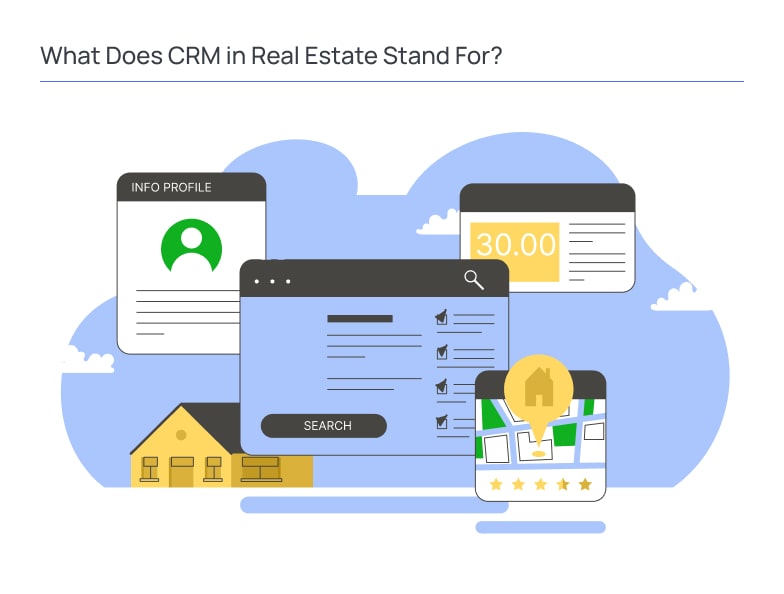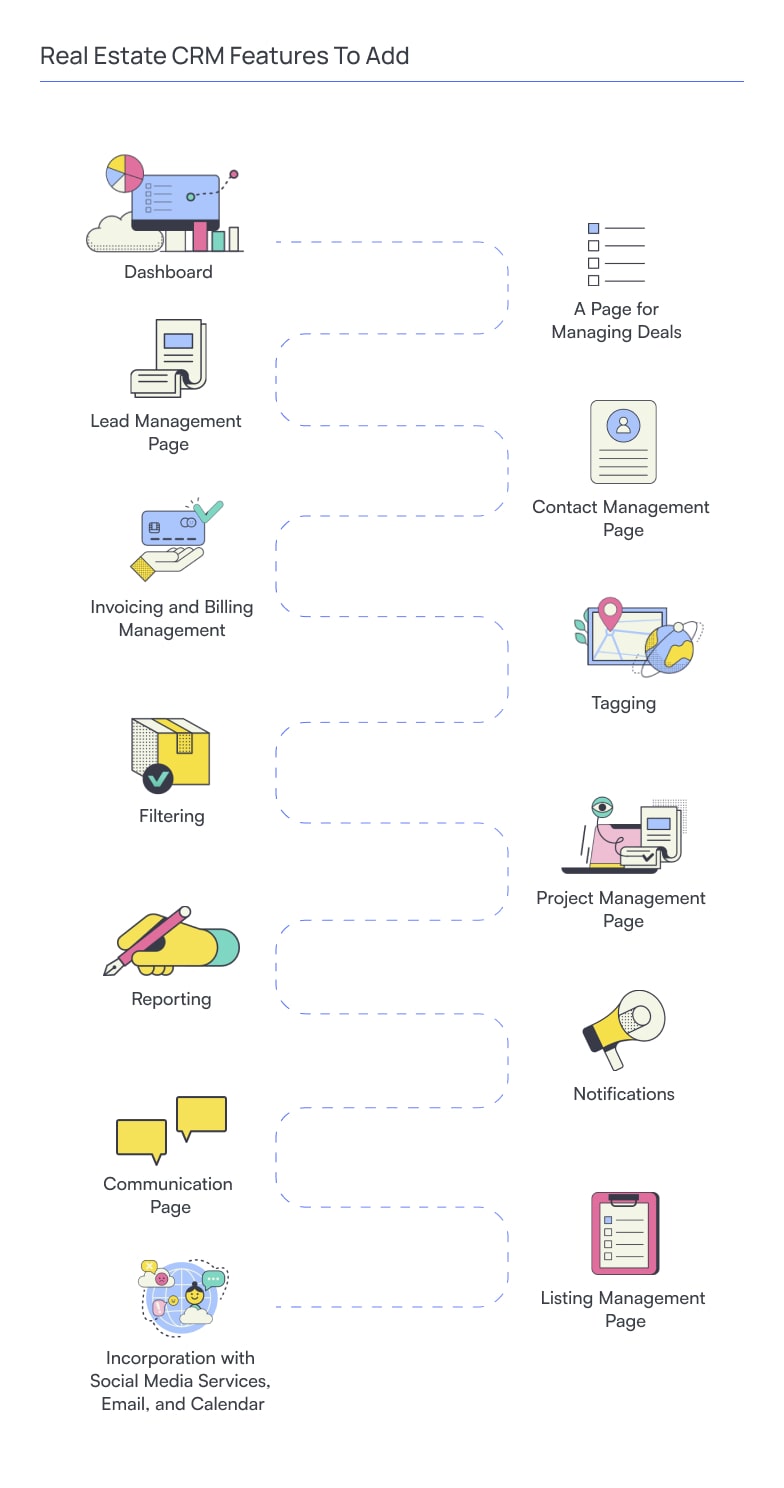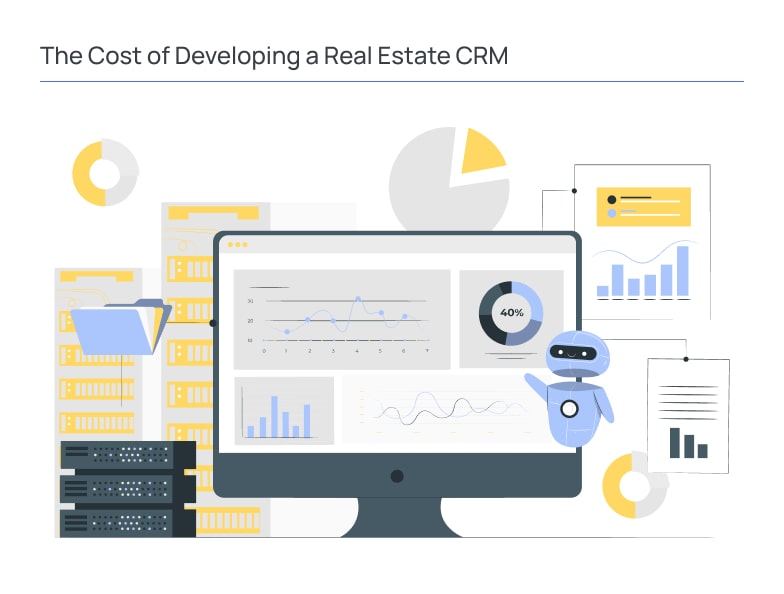It is not a secret for anyone today that effective customer relationship management (CRM) is crucial for success in the dynamic and competitive real estate industry. A well-designed CRM system can enhance operations, improve client interactions, and boost productivity. While off-the-shelf CRM solutions are readily available, some real estate businesses opt for custom CRM development to address their unique needs and workflows.
Custom real estate CRM development offers the opportunity to create a tailored solution that aligns precisely with the requirements of your real estate business. However, like any business decision, there are pros and cons to consider before embarking on a custom CRM development journey.
In this article, we will discover the advantages and disadvantages of developing a custom CRM for the real estate industry. Understanding the benefits and challenges lets you decide whether a custom CRM solution fits your real estate business. So, let’s explore the pros and cons of building a custom real estate CRM.
What Does CRM in Real Estate Stand For?

Increasing your client base is directly linked to generating more revenue. However, managing individual connections becomes challenging as the number of clients grows. With numerous daily interactions, client information may be scattered across different platforms or even handwritten on notes. It can lead to confusion regarding whom to contact and when and what topics must be discussed. In addition, relying on outdated client databases can result in disorganization and potential loss of clients.
Fortunately, modern CRM (Customer Relationship Management) software resolves these issues by providing a unified contact database and a comprehensive view of your clients.
A real estate CRM is a software solution designed specifically for professionals in the real estate industry to manage their relationships with clients, streamline their business processes, and enhance productivity. It is a centralized platform that organizes and stores crucial information such as leads, contacts, properties, transactions.
The primary objective of a real estate CRM is to help agents and brokers effectively manage their interactions with clients, provide personalized service, and ultimately drive business growth. By centralizing and automating various tasks, a CRM enables real estate professionals to optimize their workflow, save time, and focus on building strong client relationships.
A real estate CRM can be an excellent addition to the real estate app, which provides all the necessary information for clients to buy or sell their property. We have a detailed article about real estate app development.
Top Reasons To Build A Real Estate CRM
Why do you need to create a real estate CRM? Specific advantages allow real estate agents to build better customer relationships. Here they are:
Centralized Client Data Storage
A real estate CRM provides a unified platform to store all customer information, including emails, notes, and interactions. It eliminates the need for scattered data in multiple locations and allows easy access to customer details whenever needed.
Real-Time Access
With cloud-based real estate CRMs, users can access the software and data from any device with an internet connection. This online accessibility ensures you can retrieve information and work on the go, increasing efficiency and productivity.
Reduced Sales Cycle
Real estate CRMs offering real-time access have been found to shorten the sales cycle by 8-14%. With instant access to customer data, agents can quickly respond to inquiries, track leads, and move prospects through the sales pipeline more efficiently.
Zero Lead Leakage
By capturing and consolidating leads from various marketing channels (websites, listing platforms, social media, etc.), a real estate CRM helps prevent leads from slipping through the cracks. All leads are collected and managed within the CRM, ensuring comprehensive lead tracking and follow-up.
Efficient Lead Distribution
A real estate CRM enables effective lead distribution among agents. It streamlines assigning leads, ensuring timely allocation based on criteria such as property type, location, and agent availability. It ensures fair distribution and prevents leads from being neglected or mishandled.
Automated Mailing to Prospects
Real estate CRMs offer automation features for email communication. For example, you can create email templates for different responses and automate follow-ups for inquiries received through various channels like the website, email, or property bookings. So it contributes to timely and consistent communication with prospects.
Customized Lead Quality Criteria
As the number of potential customers increases, prioritizing leads becomes crucial. Real estate CRM allows you to customize lead quality criteria based on willingness to make a deal, urgency, or specific preferences. It helps agents focus their time and efforts on leads with higher conversion potential.
Filtering of Irrelevant Leads
Real estate CRM enables the filtering of irrelevant leads. Integration with verification systems, such as generating and sending one-time passwords (OTPs), helps validate lead information and identify genuine prospects. Filtering out irrelevant leads saves time and ensures more targeted engagement.
Workflow and Analytics Tracking
A real estate CRM facilitates tracking business development dynamics and key metrics. It collects and stores sales, marketing performance, agent performance, and more data. It allows you to measure progress, identify trends, and make data-driven decisions to optimize your business strategies.
Don't miss out on the benefits of a real estate CRM – explore the possibilities. Contact Binerals as an expert in real estate CRM development.
Contact BineralsReal Estate CRM Features To Add

What features do real estate agents want in a CRM? If you own a real estate agency, you can easily understand what functionality you need. However, we will help you and provide the main features to add to your CRM.
Dashboard
The dashboard provides a comprehensive overview of key performance indicators for owners, agents, and managers. It displays reports on closed deals, commission volume, sales stages, current leads, emails, calls, and meetings, allowing easy navigation and quick access to essential information.
A Page for Managing Deals
Real estate CRMs provide a deal management page where agents can create deals from the contact database. Deals can be filtered, sorted, and assigned to different stages in a sales pipeline. Agents can easily track the progress of each deal, update its status, and manage the entire deal lifecycle within the CRM.
Lead Management Page
The CRM system offers a dedicated lead management page where agents can generate and gather leads from various channels. In addition, agents can assign leads to specific agents, track their progress through the sales funnel, and maintain regular communication to ensure effective lead management.
Contact Management Page
The contact management page allows agents to view, create, edit, and delete contacts. It is a centralized repository for all contact information, including communication history, social media profiles, interests, and related tasks and notes. Contacts can be imported, exported, and automatically created through email integration.
Invoicing and Billing Management
Real estate CRMs include features for managing business transactions, including creating, storing, managing, and sharing invoices and bills. The CRM allows the creation of invoice templates for easy and efficient billing processes.
Tagging
CRMs support tagging capabilities, allowing agents to assign tags to contacts based on location, property type, budget, or goals. Tags help categorize contacts for targeted marketing and personalized communication, improving lead management and engagement.
Filtering
Both deals and contacts can be filtered and sorted within the CRM. Advanced filters can be applied based on date, acquisition channel, lead stage, location, or other custom criteria. This functionality lets agents quickly find specific deals or contacts and streamline their workflow.
Project Management Page
The project management page enables real estate company management to create tasks, assign them to agents or managers, and track their progress. Tasks can be organized based on priority, due dates, ownership, or status. The page provides a centralized view of ongoing projects, facilitating effective coordination and collaboration among team members.
Reporting
Real estate CRM systems offer robust reporting capabilities, allowing users to generate various reports related to sales, marketing, agent performance, and more. Customizable templates enable users to tailor reports to their specific needs, and the ability to group, filter, and sort reports provide valuable insights for business analysis and decision-making.
Notifications
Customer relationship systems provide customizable notifications for various actions, such as prospect activities, deal closures, or task completions. Information can be displayed on the screen and accessed from a dedicated tab, ensuring users stay updated and informed about important events and activities.
Communication Page
Real estate CRMs integrate email functionality, enabling users to write emails, schedule follow-ups, and create email templates within the CRM platform. Users can track email opens and clicks, view email statistics, and utilize custom URLs for enhanced email conversions. This streamlines communication and eliminates the need to switch between multiple email accounts.
Listing Management Page
Systems can facilitate posting property offers on multiple platforms and consolidate the links to these postings in one system. Agents can create and distribute property listings across various channels, including MLS platforms and real estate listing websites. The CRM also supports the creation of marketing campaigns to promote listed properties.
Incorporation with Social Media Services, Email, and Calendar
The final feature offers integrations with MLS platforms, social media platforms, email services (such as Gmail or Microsoft Exchange), and calendar applications. These integrations enable seamless synchronization, allowing users to post listings, track social media behavior, manage emails, and plan schedules directly within the CRM platform.
Besides that, you can also add more features considering the latest real estate technology trends.
Custom Real Estate CRM vs. Off-The-Shelf Software: Which One To Choose?
Even when you know how to build a real estate CRM system, you might consider using ready-made solutions. Why not? Yes, off-the-shelf CRMs also have their advantages. However, custom products prevail. Let’s check the pros and cons of both options.
Developing a custom real estate CRM system can offer several advantages, but it also has its drawbacks. Here are some pros and cons to consider:
Pros of Custom Real Estate CRM Development
- Tailored to your specific needs. A custom CRM allows you to build a system that meets your unique requirements and workflows. It can be designed to align with your real estate business processes, ensuring efficient lead management, property tracking, and client communication.
- Enhanced efficiency and productivity. Customizing the CRM to suit your business operations allows you to streamline processes and automate repetitive tasks. This can save time and effort for your team, enabling them to focus on high-value activities such as closing deals, nurturing relationships, and providing excellent customer service.
- Integration capabilities. Custom CRM development allows you to integrate the system with other tools and applications in your real estate operations. For example, you can connect it with property listing platforms, email marketing tools, accounting software, or document management systems. This integration can create a unified ecosystem, reducing data duplication and enhancing accessibility.
- Scalability and flexibility. As your real estate business grows, your CRM needs may evolve. With a custom CRM, you have the advantage of scalability and flexibility. The system can be designed to accommodate future expansion, handle increasing data volumes, and incorporate new features or modules as required.
Cons of Custom Real Estate CRM Development
- Cost and time investment. Developing a custom CRM involves significant upfront costs and time investment. You need to hire experienced developers or a development team, which can be expensive. The development process may also take longer than implementing an off-the-shelf CRM solution.
- Technical expertise requirement. Custom CRM development requires software development, database design, and system architecture expertise. You either need to have an in-house development team or hire external experts. Maintaining and supporting a custom CRM over time may require ongoing technical resources.
- Limited third-party support and updates. Custom CRM solutions may lack extensive support and regular updates with popular off-the-shelf CRM software. Instead, you’ll need to rely on your development team or hire external experts to address any issues, implement enhancements, or fix bugs in the system.
Now, let’s talk about off-the-shelf CRM systems available in the market. Here are some pros and cons:
Pros of Off-the-Shelf Real Estate CRM
- Cost-effective. Off-the-shelf CRM solutions are typically more cost-effective compared to custom development. These systems have a pre-built framework designed to cater to the needs of a wide range of real estate businesses. They often offer flexible pricing plans, allowing you to choose a package that aligns with your budget.
- Quick implementation. Implementing an off-the-shelf CRM is generally faster than custom development. The system is already built, and you can start using it after configuration and data import. This can be beneficial if you need a CRM solution up and running quickly to manage your real estate operations.
- Ongoing support and updates. Reputable off-the-shelf CRM vendors typically provide regular updates, bug fixes, and technical support. They have dedicated teams focused on maintaining and improving their product, ensuring that you have access to the latest features and enhancements without additional development costs.
Cons of Off-the-Shelf Real Estate CRM
- Limited customization. Off-the-shelf CRMs have predefined features and workflows, which may not align perfectly with your specific business requirements. While they offer some level of customization, it is often limited to configuration options within the provided framework.
- Compatibility challenges. Integrating an off-the-shelf CRM with your existing systems, such as property listing platforms, email marketing tools, or accounting software, may present challenges. These systems might not have built-in integration capabilities, and you may need to rely on third-party tools or custom development to establish the required integrations.
- Lack of flexibility for unique workflows. If your real estate business has unique workflows or processes that deviate significantly from industry norms, an off-the-shelf CRM may not accommodate them effectively. As a result, you might have to adapt your strategies to fit within the limitations of the CRM system.
- Data security and ownership. With an off-the-shelf CRM, your data is stored in the vendor’s system. Therefore, it’s important to consider data security measures implemented by the vendor and review their data ownership and privacy policies. You may have less control over your data than with a custom-built CRM solution.
- Vendor reliance. By choosing an off-the-shelf CRM, you rely on the vendor for ongoing support, updates, and bug fixes. Suppose the vendor discontinues the product or fails to meet your evolving needs. In that case, you may need to switch to a different CRM solution, potentially resulting in data migration challenges and additional costs.
Thus, custom software development can be a beneficial option if you strive to take the utmost of your CRM system. To achieve this, you need to hire a talented and skilled real estate CRM software development company like Binerals, and our company will build your CRM system from scratch.
The Cost of Developing a Real Estate CRM: Crucial Aspects That Form A Price

The cost of creating a custom real estate CRM system can vary significantly depending on several factors. Here are some crucial factors to consider when estimating the cost:
Scope and Complexity
The scope and complexity of the CRM project play a significant role in determining the cost. First, consider the features and functionalities you need, such as lead management, property tracking, client communication, reporting, integrations, and automation. The more extensive and complex the requirements, the higher the development cost.
Development Team
The cost of hiring a development team or engaging a software development company is a significant factor. The team’s size, experience, and location can influence the price. Highly skilled developers typically command higher rates. Additionally, their fees will contribute to the overall cost if you work with an external development agency.
Design and User Experience
A well-designed and user-friendly CRM can enhance user adoption and productivity. However, the cost of creating an intuitive user interface, responsive design, and a seamless user experience should be considered. This cost includes the services of UX/UI designers and front-end developers.
Integration Requirements
Suppose you must integrate CRM with other systems or tools, such as property listing platforms, email marketing software, accounting systems, or document management solutions. In that case, it may require additional development effort and cost. The complexity and number of integrations needed will impact the overall cost.
Infrastructure and Hosting
Consider the cost of the required infrastructure and hosting for your custom CRM. This includes servers, cloud services, databases, and security measures. The hosting cost can vary based on your CRM system’s scalability and performance requirements.
Maintenance and Support
Building a custom CRM involves ongoing maintenance and support. You’ll need to allocate resources and budget for bug fixes, system updates, security patches, and feature enhancements. Therefore, it’s essential to factor in the long-term costs of maintaining and supporting the CRM solution.
Testing and Quality Assurance
Thorough testing and quality assurance ensure a robust and error-free CRM system. This includes unit testing, integration testing, user acceptance testing, and performance testing. Allocating time and budget for testing activities is vital to deliver a reliable and high-quality CRM solution.
Providing an exact cost without specific project details is challenging, as each custom CRM project is unique. However, custom CRM development costs can range from tens to hundreds of thousands of dollars, depending on the abovementioned factors.
Before starting custom CRM development, it’s crucial to define your requirements, conduct a feasibility analysis, and work closely with a development team or software development company to get a comprehensive cost estimate for your specific project.
Drawing the Line
A real estate CRM is no longer a luxury but a necessity for any real estate agent or company striving for success in today’s competitive market. By adopting a reliable real estate CRM, agents can manage their contacts, leads, and deals in one centralized system, ensuring no opportunities slip through the cracks. Automating tasks, tracking progress, and generating insightful reports enable informed decision-making and increased productivity.
So, whether you are a solo agent, a growing team, or a real estate agency, now is the time to embrace the power of a real estate CRM. Embrace the advantages it offers and propel your business to new heights of success. So unlock the full potential of your real estate endeavors with a comprehensive and feature-rich CRM solution.
Get ahead in the competitive real estate market - Implement a CRM solution now with Binerals. Contact us right away!
Contact Us